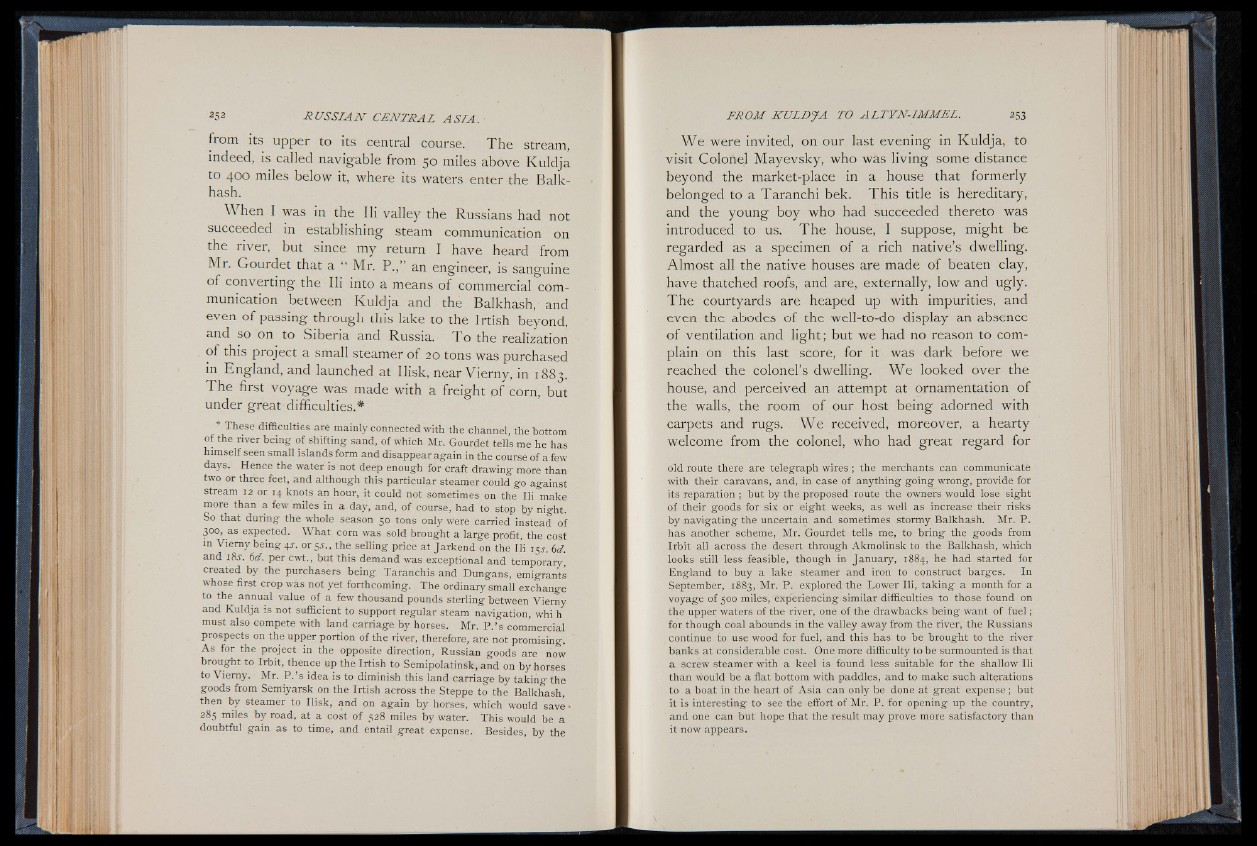
from its upper to its central course. The stream,
indeed, is called navigable from 50 miles above Kuldja
to 400 miles below it, where its waters enter the Balkhash.
When I was in the Ili valley the Russians had not
succeeded in establishing steam communication on
the river, but since my return I have heard from
Mr. Gourdet that a “ Mr. P.,” an engineer, is sanguine
of converting the Ili into a means of commercial communication
between Kuldja and the Balkhash, and
even of passing through this lake to the Irtish beyond,
and so on to Siberia and Russia. To the realization
. of this project a small steamer of 20 tons was purchased
in England, and launched at Ilisk, near Vierny, in 1883.
The first voyage was made with a freight of corn, but
under great difficulties.*
* These difficulties are mainly connected with the channel, the bottom
of the river being of shifting sand, of which Mr. Gourdet tells me he has
himself seen small islands form and disappear again in the course of a few
days. Hence the water is not deep enough for craft drawing more than
two or three feet, and although this particular steamer could go against
stream 12 or 14 knots an hour, it could not sometimes on the Ili make
more than a few miles in a day, and, of course, had to stop by night.
So that during the whole season 50 tons only were carried instead of
300, as expected. What com was sold brought a large profit, the cost
in Vierny being 4T. or ¡s ., the selling price at Jarkend on the Ili 15X.
and iSs. 6d. per cwt., but this demand was exceptional and temporary,
created by the purchasers being Taranchis and Dungans, emigrants
whose first crop was not yet forthcoming. The ordinary small exchange
to the annual value of a few thousand pounds sterling between Vierny
and Kuldja is not sufficient to support regular steam navigation, whi h
must also compete with land carriage by horses. Mr. P .’ s commercial
prospects on the upper portion of the river, therefore, are not promising.
A s for the project in the opposite direction, Russian goods are now
brought to Irbit, thence up the Irtish to Semipolatinsk, and on by horses
to Vierny. Mr. P .’s idea is to diminish this land carriage by taking the
goods from Semiyarsk on the Irtish across the Steppe to the Balkhash,
then by steamer to Ilisk, and on again by horses, which would save *
285 miles by road, at a cost of 528 miles by water. This would be a
doubtful gain as to time, and entail great expense. Besides, by the
We were invited, on our last evening in Kuldja, to
visit Colonel Mayevsky, who was living some distance
beyond the market-place in a house that formerly
belonged to a Taranchi bek. This title is hereditary,
and the young boy who had succeeded thereto was
introduced to us. The house, I suppose, might be
regarded as a specimen of a rich native’s dwelling.
Almost all the native houses are made of beaten clay,
have thatched roofs, and are, externally, low and ugly.
The courtyards are heaped up with impurities, and
even the abodes of the well-to-do display an absence
of ventilation and light; but we had no reason to complain
on this last score, for it was dark before we
reached the colonel’s dwelling. W e looked over the
house, and perceived an attempt at ornamentation of
the walls, the room of our host being adorned with
carpets and rugs. We received, moreover, a hearty
welcome from the colonel, who had great regard for
old route there are telegraph wires ; the merchants can communicate
with their caravans, and, in case of anything going wrong, provide for
its reparation ; but by the proposed route the owners would lose sight
of their goods for six or eight weeks, as well as increase their risks
by navigating the uncertain and sometimes stormy Balkhash. Mr. P.
has another scheme, Mr. Gourdet tells me, to bring the goods from
Irbit all across the desert through Akmolinsk to the Balkhash, which
looks still less feasible, though in January, 1884, he had started for
England to buy a lake steamer and iron to construct barges. In
September, 1883, Mr. P. explored the Lower Ili, taking a month for a
voyage of 500 miles, experiencing.similar difficulties to those found on
the upper waters o f the river, one of the drawbacks being want of fu e l;
for though coal abounds in the valley away from the river, the Russians
continue to use wood for fuel, and this has to be brought to the river
banks at considerable cost. One more difficulty to be surmounted is that
a screw steamer with a keel is found less suitable for the shallow Ili
than would be a flat bottom with paddles, and to make such alterations
to a boat in the heart of A sia can only be done at great expense; but
it is interesting to see the effort of Mr. P. for opening up the country,
and one can but hope that the result may prove more satisfactory than
it now appears.